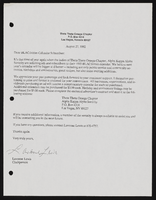Search the Special Collections and Archives Portal
Search Results

Alpha Kappa Alpha Sorority, Theta Theta Omega Chapter "BLACtivities" calendar subscriber letter
Date
Archival Collection
Description
From the Alpha Kappa Alpha Sorority, Incorporated, Theta Theta Omega Chapter Records (MS-01014) -- Chapter records file.
Text
Joe Burton oral history interview
Identifier
Abstract
Oral history interview with Joe Burton conducted by Bob Barrera on March 11, 1980 for the Ralph Roske Oral History Project on Early Las Vegas. Burton discusses his frozen food manufacturing business’ procedures and practices, and how the equipment he used changed over the years. Burton also talks about how he felt about the Mafia running the casinos on the Las Vegas Strip. He also weighs in on the MX missiles being located in Las Vegas.
Archival Collection
Arthur Marshall oral history interview
Identifier
Abstract
Oral history interview with Arthur Marshall conducted by Claytee D. White on February 11, 2014 for the Boyer Early Las Vegas Oral History Project. In this interview Arthur Marshall discusses meeting his wife Jayn, moving to Las Vegas, Nevada, and running a clothing store with his brother-in-law. He also discusses serving as President of Temple Beth Sholom, being instrumental in the formation of the Anti-Defamation League, being a member of the American Israel Public Affairs Committee, and spending twelve years on the Nevada Gaming Commission.
Archival Collection
Ruth Urban oral history interview
Identifier
Abstract
Oral history interview with Ruth Urban conducted by Barbara Tabach on August 24, 2015 and September 16, 2015 for the Southern Nevada Jewish Heritage Project. Urban discusses her upbringing in Las Vegas, Nevada, including observations on childhood friendships, many of whom came from within the Jewish community. She talks extensively about her professional career and passion for mediation as a strategy for problem-solving. In addition, Urban describes her community service commitments over the years, including her current role with Nevadans for the Common Good.
Archival Collection
Monroe Williams oral history interview
Identifier
Abstract
Oral history interview with Monroe Williams conducted by Claytee D. White on August 15, 2000 and August 22, 2000 for the Boyer Early Las Vegas Oral History Project. In this interview Monroe Williams discusses moving to Las Vegas, Nevada in 1943, living in the historical Westside neighborhood, and being one of the first black fire fighters in Las Vegas. He also talks about being involved with the National Association for the Advancement of Colored Peoples (NAACP), being in the Navy for two years, and his real estate and property management companies.
Archival Collection
Mustafa Richards oral history interview
Identifier
Abstract
Oral history interview with Mustafa Richards conducted by Claytee D. White on March 10, 2013 for the African Americans in Las Vegas: a Collaborative Oral History Project. He discusses working as the only black bellman at the time for the Imperial Palace Hotel and Casino and became the first African American bell captain. He also discusses his wife working for the Las Vegas, Nevada Clark County Library District for thirty years. Mustafa then discusses becoming a Muslim in the early 1990s and being appointed to be an Imam, a mosque officer, soon afterwards.
Archival Collection
John Woodrum oral history interview
Identifier
Abstract
Oral history interview with John Woodrum conducted by David Schwartz on June 12, 2006 for the UNLV @ 50 Oral History Project. In this interview, Woodrum discusses his career in gaming operations. He begins by mentioning how he grew up in Kentucky and has lived through World War II. He also explains how gaming regulations vary throughout the United States. Woodrum states that one of his first jobs was working in the sales and marketing category for the Thunderbird Hotel and Casino. He then speaks about gambling and its changes over the years.
Archival Collection
Ramont L. Williams Sr. oral history interview
Identifier
Abstract
Oral history interview with Ramont L. Williams Sr. conducted by Claytee D. White on September 30, 2020 for African Americans in Las Vegas: a Collaborative Oral History Project.
Ramont Williams tells of his experience as a gang member, first as a "GQ" and later as a "Donna Street Crip." In 1980, Williams received a prison sentence of 61 years. He discusses his time in jail and his views on gang violence as well as the needs of community members who are affected by it. Subjects discussed include: Crips; Donna Street; Bullying; Richard Steele Boxing Club; and Hope 2000 Nonprofit Organization
Archival Collection
Francie Summers oral history interview
Identifier
Abstract
Oral history interview with Francie Summers conducted by Stacia Luigi on October 14, 2009 for the Public School Principalship Oral History Project. In this interview, Summers reflects upon her 35-year career as a teacher and principal with Nevada’s Clark County School District (CCSD). She describes her experience teaching at different private and public schools, how she later became a principal, and how her philosophy of education changed throughout her career. She also provides her opinion on contemporary topics such as standardized testing, student ethics, No Child Left Behind, and teacher grievances.
Archival Collection
Curtis Jones oral history interview
Identifier
Abstract
Oral history interview with Curtis Jones conducted by Lisa Holm on November 18, 2006 for the Public School Principalship Oral History Project. In this interview, Jones reflects on his nearly 30-year career in the Clark County School District as a teacher, assistant principal, and principal from the late 1970s to the early 2000s. He discusses his family upbringing and early inspirations that led him to pursue principalship, and challenges that he faced as a school administrator. He also discusses pressures that teachers and administrators face on a regular basis, and offers suggestions for how to manage job demands.
Archival Collection
